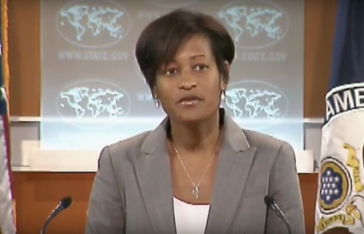
The recently released documents related to the FBI investigation into Hillary Clinton’s use of a private email server raise just about as many new questions as they provide answers. However, they do shed new light on the extremely unique role Clinton’s longtime aide, confidante and counselor Cheryl Mills played in this whole affair. The Department of Justice and the FBI not only interviewed Mills as fact witness in her role as State Department Chief of Staff, but they also allowed her to participate in Clinton’s FBI interview as a member of Clinton’s legal team. This arrangement seemingly presented some legal hurdles for investigators, and was likely the source of some understandable frustration as well.
If you remember back in May, the Washington Post reported that Mills and her attorney walked out of her FBI interview after an agent apparently asked about a topic that was “off-limits.” The article stated:
The questions that were considered off-limits had to do with the procedure used to produce emails to the State Department so they could possibly be released publicly, the people said. Mills, an attorney herself, was not supposed to be asked questions about that — and ultimately never was in the recent interview — because it was considered confidential as an example of attorney-client privilege, the people said.
The article did note that Mills was an attorney, but never really explained the circumstances surrounding what happened and why that topic was protected by attorney-client privilege. We found out more information a few weeks after Mills’ gave a separate deposition in a FOIA lawsuit brought by Judicial Watch.
During the deposition, Mills’ attorney, Beth Wilkinson, objected to a number of questions on the basis of attorney-client privilege and instructed Mills not to answer various questions. It was further explained that Clinton left the State Department in 2013, she then hired Mills to serve as part of her personal legal team. In that capacity, Mills claimed she helped coordinate Clinton’s response to the demand that she return her emails to the State Department. Therefore, Mills would claim attorney-client privilege prevented her from answering questions about how they decided to turnover documents.
However, Mills could not claim attorney-client privilege covered information she learned during her time as Clinton’s Chief of Staff. So, as Shannen Coffin, a former DOJ attorney, recently explained in an article at the Weekly Standard, “To fix that problem, Mills conveniently claimed that she did not know anything about Clinton’s email setup during her tenure at the State Department and only learned of relevant facts in her later capacity as Mrs. Clinton’s personal lawyer.”
For example, during the FOIA deposition, Mills was asked a question about why Clinton started using the clintonemail.com system. Her attorney objected to question, saying that was also covered by attorney-client privilege.
“[Mills] — she learned this — refreshed her recollection — when she was acting as the Secretary’s lawyer, producing documents to the State Department,” Wilkinson said.
This essentially allowed Mills to claim attorney-client privilege covered any question, so long as Mills either first learned the information or refreshed her recollection about the information in her capacity as part of Clinton’s legal team, after leaving the State Department.
With the release of the Clinton’s FBI 302 interview form last Friday, we finally learned that Mills was listed as one of Clinton’s four attorneys present at the July 2 interview.
According to the FBI 302 interview form, “Present, for the interview were CLINTON attorney’s David F. Kendall, Catherine M. Turner, Chervl D. Mills, Heather Samuelson and [name redacted].”
Thus, it appears as though the Department of Justice agreed to treat Mills as both Clinton’s lawyer and fact witness. Though the FBI has not publicly released a 302 interview form from the Mills interview, we can likely conclude that this unusual treatment of Mills is what lead to the reported walkout during her interview session.
It is also what likely led to the reported disagreement between the FBI agents and DOJ lawyers in the room. The situation was odd, to say the least.
“The Department of Justice agreement to limit the scope of a criminal interview based on untested claims of attorney-client privilege is, at the very least, unusual,” Coffin writes. “For the more conspiracy minded, it’s downright outrageous.”
This is an opinion piece. The views expressed in this article are those of just the author.